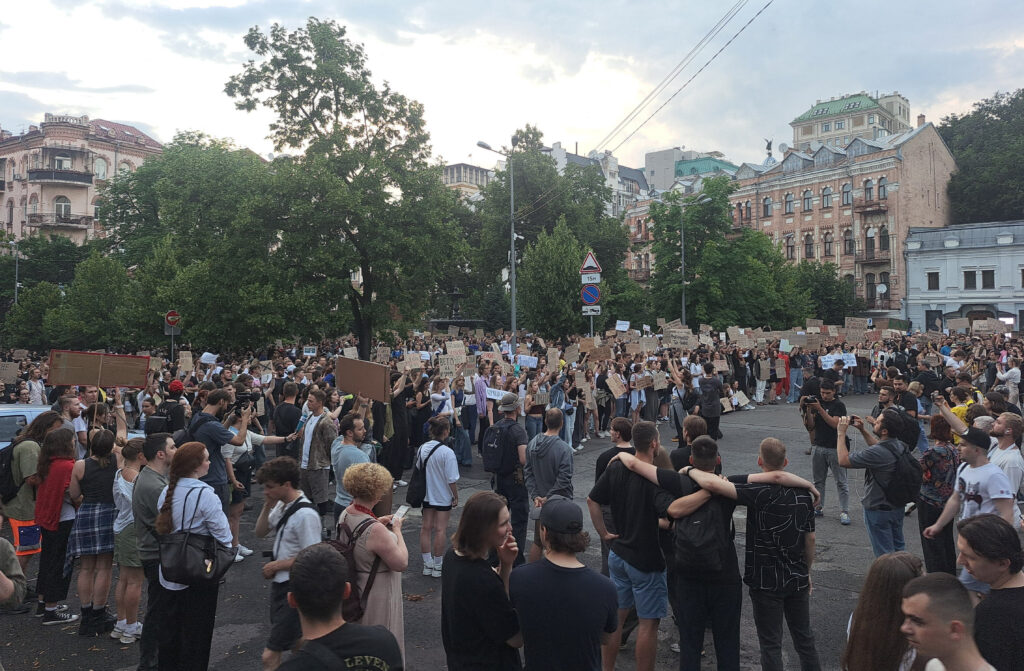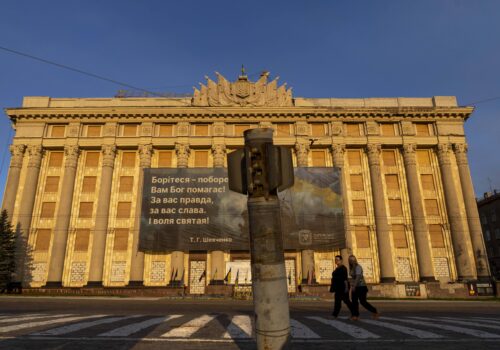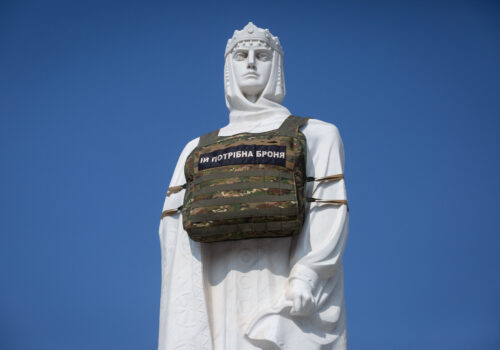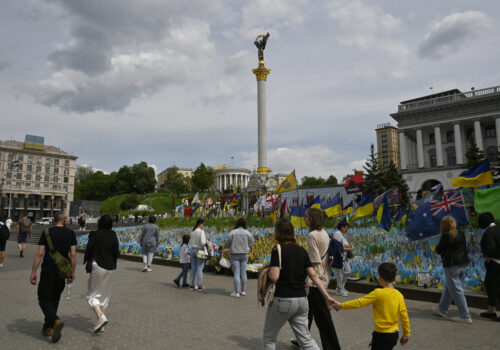Ukraine’s first anti-government protests since the start of Russia’s full-scale invasion took place on July 22 as thousands of Ukrainians took to the streets to express anger and dismay over what critics see as a campaign to strip the country’s anti-corruption agencies of their independence. For more than a decade, Ukrainians have been fighting a two-front war: against Russian aggression and against high-level political corruption. President Volodymyr Zelenskyy promised “victory over corruption” after his 2019 election and has become a worldwide symbol of freedom since the full-scale Russian war began in 2022. So his administration’s moves this week to gut independent anti-corruption agencies are puzzling, to say the least.
On July 21, law enforcement agencies raided the offices of the National Anti-Corruption Bureau of Ukraine (NABU) and declared investigations into fifteen NABU employees, allegedly as part of an ongoing effort to prosecute traffic violations. This sort of harassment on obscure charges has plagued other investigative agencies and individuals, but rarely was it used against institutions like NABU, which was created in 2014 as an independent body to tackle high-level government corruption. While NABU has had its problems, Ukrainian and Western experts widely acknowledge it as one of the country’s most important post-Maidan reform projects.
Stay updated
As the world watches the Russian invasion of Ukraine unfold, UkraineAlert delivers the best Atlantic Council expert insight and analysis on Ukraine twice a week directly to your inbox.
Unfortunately, this was no petty shake down. Law enforcement—led by the Security Service of Ukraine (SBU) and the Prosecutor General’s Office—announced that the centerpiece of its investigation was charges of treason against a pro-Russian member of parliament who allegedly worked with NABU detectives to influence investigations at the behest of Russian intelligence services. The SBU, whose leadership is chosen by the president of Ukraine, named two of NABU’s top detectives as having connections to Fedor Khyrstenko, the lawmaker charged with acting in Kremlin interests against Ukraine. They also alleged the detectives helped Ukrainian oligarchs flee the country to avoid criminal charges.
Western partners in Kyiv swiftly urged the Zelenskyy administration to end its harassment of NABU. Undeterred by such warnings, reports surfaced that Zelenskyy’s National Security and Defense Council (NSDC) was planning “amendments to the Criminal Procedure Code” in an effort to ensure “the purity of the work of law enforcement … and remove opportunities for corruption.” Observers feared this portended further obstruction of NABU’s work.
Those fears were confirmed on July 22, when the NSDC asked the Ukrainian parliament to introduce a draft law that would put NABU and the Special Anti-Corruption Prosecutor’s Office (SAPO)—the independent prosecutorial counterpart to NABU—under the control of the Prosecutor General’s Office. In effect, this would make them subordinate to the Office of the President and likely end their ability to investigate state corruption independent of influence from the government.
The parliament quickly passed the law thanks to support from Zelenskyy’s Servant of the People party and with key votes from the remaining pro-Russian parties. Zelenskyy hastily signed the bill into law, despite widespread domestic and international calls not to do so.
But the fiasco has already succeeded in mobilizing Ukraine’s famously civic-minded public. Protests, while still relatively small in number, broke out in Kyiv, Lviv, Odesa, and Dnipro just hours after parliamentarians passed the bill.
Eurasia Center events

Ukraine’s government and law enforcement agencies insist these moves are an effort to root out Russian influence in NABU and SAPO to prevent the agencies from being co-opted against the Ukrainian state. But civil society experts and journalists are not convinced. Many suggest the attempted purges are payback for NABU pursuing charges of illicit enrichment and abuse of office against former deputy prime minister Oleksiy Chernyshov, a key ally for the Office of the President. Ironically, it was Zelenskyy himself who brought back criminal liability for illicit enrichment back in 2019 during his original anti-corruption drive.
Others see the moves as part of a broader effort to crack down on corruption investigations. On July 11, armed police raided the home of Vitaliy Shabunin, co-founder of the nonprofit Anti-Corruption Action Center, and detained him on suspicion of evading military service. Critics say the charges are politically motivated.
The harassment of independent anti-corruption agencies throws Ukraine’s European Union (EU) membership bid into doubt. EU Commissioner for Enlargement Marta Kos declared that the independence of NABU and SAPO was “essential” for Ukraine’s EU path. “Rule of Law remains in the very center of EU accession negotiations,” she commented. Already forced to fight for a war its existence, Ukraine has “no room for error” in securing its democracy and European future, others noted.
Ukraine also risks alienating its most important partners in defending itself from Russian aggression. The Ukrainian government, civil society, and the country’s Western partners have had to vigorously fight Russian-amplified narratives portraying Ukraine as a hopelessly corrupt country unworthy of military aid. Willfully tearing down the anti-corruption institutions created after Ukraine’s 2014 Revolution of Dignity risks giving credence to voices that wish Ukraine harm.
Just two short weeks ago, Kyiv officials were courting Western investment for post-war reconstruction at the Ukraine Recovery Conference in Rome. Already uncertain about entering a potentially unstable security and political environment, many international businesses will balk at entering a market governed by fiat.
The best outcome for Ukraine would be for Zelenskyy to decline to sign the bill into law and refocus on pushing invading Russian forces out of the country. NABU, SAPO, and other watchdog organizations have helped make Ukraine more resilient amid the existential danger of the Russian war. Zelenskyy has proven to be a superb leader of a nation made stronger by its institutions that hold power to account—leadership qualities urgently needed now to halt this series of counterproductive moves.
Andrew D’Anieri is the associate director of the Atlantic Council’s Eurasia Center. Find him on X at @andrew_danieri.
Further reading
The views expressed in UkraineAlert are solely those of the authors and do not necessarily reflect the views of the Atlantic Council, its staff, or its supporters.

The Eurasia Center’s mission is to enhance transatlantic cooperation in promoting stability, democratic values, and prosperity in Eurasia, from Eastern Europe and Turkey in the West to the Caucasus, Russia, and Central Asia in the East.
Follow us on social media
and support our work
Image: Despite martial law being in force, hundreds of Ukrainians demonstrate spontaneously against a law that restricts the independence of anti-corruption bodies. They demand a veto from President Zelensky.





